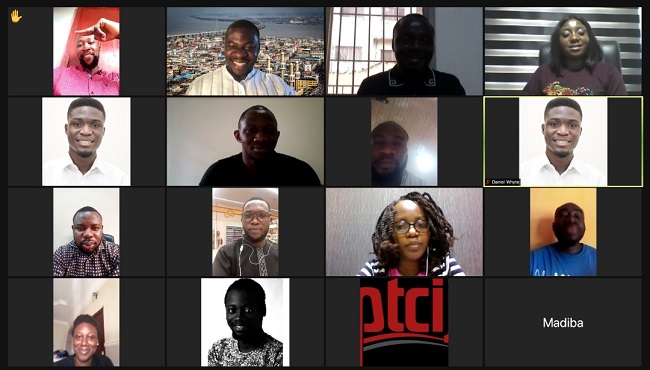As part of its regional expansion plan and commitment to media innovation and development in Africa, the Premium Times Centre for Investigative Journalism (PTCIJ) through its Natural Resource, Extractives and Climate Change Programme (NAREP), has commenced a three-month climate change media fellowship programme for media practitioners drawn from across five anglophone West African countries.

The inaugural climate change fellowship, birthed from the rising negative impacts of climate change across Africa, included clusters of journalists, researchers and public analysts from Nigeria, Ghana, Sierra Leone, Liberia and The Gambia, who would help with quality reporting and analysis of climate change issues in the region.
For a better understanding of the biggest issue ravaging the continent, the fellows were taken through a three-day training organised by NAREP which began on Tuesday, August 3 and ended on Thursday, August 5, 2021, drawing facilitators from the continent who helped in dissecting the issues.
The Programme Manager, Natural Resource, Extractives and Climate Change Programme, Akintunde Babatunde, in his remarks, said the training was influenced by PTCIJ’s commitment to improving the knowledge product on climate change in Africa.
“Climate change is one of the greatest challenges we are facing in Africa but, unfortunately, we don’t have many reports detailing how this is affecting vulnerable groups, so for us at PTCIJ, we are using this fellowship to build the next generation of climate professionals who will publish reports to detail the effects of climate change on vulnerable groups, the resilience of our people and also reports to hold our givers accountable.”
The Experience
Sharing their thoughts on the impact of the training and their expectations of the fellowship, the fellows believe the fellowship is timely and the output would help give consequence to climate issues the continent is grappling with.
A fellow and an environmentalist from Nigeria, Seyifunmi Adebote, said: “These three days of intensive training has left me feeling very empowered as a young Nigerian deeply passionate about environmental issues. Having the opportunity to learn, relearn and unlearn about climate change – the basics, the science, the propaganda and the most effective ways of communicating impact and actions.
“I am excited about the carefully-researched reports and multidisciplinary policy papers that would be published in the coming days as fellows and mentors collaborate to shape climate change knowledge and access to correct information across West Africa. Hoping to physically connect with other fellows, as soon as COVID allows,” Adebote said.
He expresses gratitude to the “facilitators and the resource persons for giving their best and ensuring an almost seamless training programme, albeit virtual”.
Another fellow, Zubaida Afua Mabuno Ismail from Ghana, while appraising the fellowship, said: “Climate change reporting has not been my speciality in journalism, though I have written some stories on it but, as daring as I am, I decided to apply for this and I got selected.
“In the last three days, I have acquired expert insights on the topics treated including emission, treaties like the Paris Agreement, and the politics in climate change issues.
“I am well placed to identify the linkage between climate and poverty, urban migration, etc. This was a full packed training and I have some critical topics to go after in the next three months,” she concluded.
Patrick Kargbo, also a fellow on the research track from Sierra Leone, said the three days training organised by NAREP was well planned and executed as per expectations. “It was an educational and interactive three-day session with exceptional facilitators,” he said.
For Kingsley Onu, a lecturer in a Nigerian university, “the training was engaging and fact revealing. I have acquired knowledge on climate change reporting, negotiations, policy and public engagement. The resource persons were seasoned. I look forward to cordial and resourceful research collaboration on climate change within the next three months.”
In his closing remarks, the Programme Assistant for NAREP, Daniel Whyte, said: “Climate change is one of the pressing issues of this time and there is no doubt that sub-Saharan Africa and, indeed, the West African sub-region is one of the most vulnerable regions.
“With this fellowship, we hope to deepen climate change communication across this sub-region so that people and policymakers become more aware and they can take action. We are also keen on telling solution stories. So we hope that, with this fellowship, our fellows will be better equipped to tell solutions-oriented stories and we will be able to amplify local solutions that are already existent in these countries.
“I am excited about this inaugural fellowship and I look forward to an amazing three months working with our selected fellows,” Whyte stated.
Africa, including the global communities, has in recent times been experiencing devastating effects of climate change as seen in extreme weather conditions such as flooding, heat wave, drought, wildfire etc. There is a global effort to achieve the 1.5 degrees target and cut global emissions by 45 percent by 2030 as stated in the Paris Agreement.
The United Nations Secretary-General, Anthonio Guterres, in his statement that reads in part at the G20 Ministerial meeting on Environment Climate and Energy, said: “The world urgently needs a clear and unambiguous commitment to the 1.5 degree goal of Paris Agreement.”
Mr. Guterres further states that “with less than 100 days left before COP 26, I urge all G20 and other leaders to commit to zero by mid-century, present more ambitious 2030 national climate plans and deliver on concrete policies and actions aligned with a net zero future including no new coal after 2021, phasing out fossil fuel subsidies and agreeing to a minimum international carbon pricing floor as proposed by the IMF.”
By Felicia Dairo
